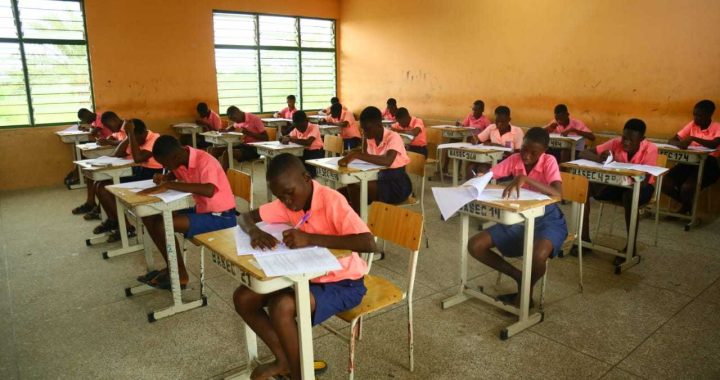‘Enhancing Productivity: The Case of the Uncommon Worker’ Full Speech by Rev. Bernard Arde-Acquah (4)
‘Enhancing Productivity: The Case of the Uncommon Worker’ Full Speech by Rev. Bernard Arde-Acquah (3)
‘Enhancing Productivity: The Case of the Uncommon Worker’ Full Speech by Rev. Bernard Arde-Acquah (1) and
‘Enhancing Productivity: The Case of the Uncommon Worker’ Full Speech by Rev. Bernard Arde-Acquah (2)
are worth reading before reading this.
Part Four:
- TRUTH is the diligent pursuit of knowledge backed by research which investigates and establishes that you have been taught. This makes you proficient and allows you to utilize the knowledge to solve problems in an effective way
Secondly, that requirement of TRUTH allows you to deal with society in a just and equitable way that builds trust. Truth creates trust – a key national asset that allows for the well-being and health of the citizenry. (e.g measurements and justice system). Let us all commit to institutionalizing truth in our country
- DISCIPLINE refers to the observance of appropriate behaviour or way of life. A disciplined person has learnt to do away with destructive behaviour which stifles growth. Such a person understands the repercussions of his conduct and therefore strives to do only the things which have positive consequences. Formal education can impart discipline into students by employing or creating reformative punishment systems which reward discipline and sanction indiscipline.
There must be punitive measures to check unacceptable conduct such as tardiness, indecent dressing, vulgar language, and absenteeism. This kind of education produces a breed of productive, punctual, trustworthy, and loyal citizens that allows them to deliver in a disciplined manner with the welfare of their companies and countries at heart.
A major aspect of discipline is self-discipline – “the ability to do what
is necessary or sensible without needing to be urged by somebody else”.
Self-discipline is also defined as the ability to do what has to be done at the time it has to be done whether it is convenient or not. The lack of self-discipline in many ‘educated’ people is the cause of their failure. It is self-discipline which will make a government official reject a bribe or an athlete refuse dope.
Discipline makes people law-abiding, faithful, and trustworthy. Education must produce disciplined people who will not steal, cheat, disobey rules, and disrespect authority.
In his book My Vision: Challenges in the Race for Excellence, Mohammed bin Rashid Al Maktoum, the ruler of Dubai and the Vice- President of the United Arab Emirates said:
If parents are serious about their children’s future, they should be equally serious about how they deal with them. They should urge them to study at the right time; teach them to respect themselves, their family and others; and help them develop the best behaviour at home, at school and elsewhere.
If parents want to help their children successfully move from one stage of life to another, they need to exercise the appropriate amount of firmness.” I believe this is the way to go. It is the sole responsibility of the home and school to teach individuals right and appropriate behaviour. The workplace is not a place to teach people discipline; it is a place for production.
- ORDER
Order refers to an organized condition, with items arranged properly, neatly, or harmoniously; it also refers to the proper observance of the right or appropriate protocol or process. Order, in another sense of the word, means the proper positioning of priorities. There is order in beauty and beauty in order. Anything arranged in order looks beautiful and attractive. Imagine how unattractive you would look if you wore your clothes before taking your bath, the right and attractive order is to bath before wearing your clothes.
Disorder is another synonym for chaos; where things are done haphazardly. Lateness and tardiness is an acceptable norm at many state functions among the elite. Driving, buildings codes, sanitation laws are violated, lack of address and tracking systems are non-existent in a small ‘village’ like Ghana
A major indicator of a good educational system that leads to productive and meaningful work is the observance of personal order and prioritization.
Personal order refers to the condition of order in an individual’s life. In this condition of personal order, the individual, for example, knows when to study, work, marry, and sleep, among others. A disordered life is unattractive and repulsive.
If an individual has not been taught to observe order and protocol from home and school, he will display disorderliness and chaos in the workplace. Such a person must always be supervised before he can work. If a person cannot put his own life in order how can he manage a company or nation?
Insisting that children in the home complete simple chores like doing homework before watching television and performing house tasks before playing may seem trivial but will be building a sense of order in the young child.
Another way to nurture order in children is to teach children to know and respect the hierarchy in the home. They should be made to know that parents are at the top of the hierarchy, followed by the eldest child then on to the youngest child. Children should know that everyone in the hierarchy commands a certain level of respect.
It is important to note that before an individual begins to show signs of disorder and chaos as an adult that such behaviour had been with him from childhood and had been allowed to grow. It is surprising to find adults who cannot prioritize. With their inability to organize their scale of preference, some of these individuals may end up in positions of leadership where they would be expected to make decisions for a larger number of people.
Order also results in and has implications for the strict observance of due process. It is common in our society to find people who always want to outwit the system by short-circuiting it. They either pay bribes or lobby others for unwarranted favours. The root cause of this canker is the failure of education to make people conform to the principles of order. If everyone were for example to jump a queue because it was too long or drive through the traffic light (even by law makers), what will be the essence of our civilization? In this case, teaching people to follow order by being patient and wait for their turn at an early age will help.
- RESPONSIBILIY
Another vital virtue which education must teach individuals is responsibility – the state, fact or position of being liable for your actions and decisions; and also, being accountable to an authority figure for your actions.
Character education instills into individuals a sense of responsibility, where they are trained to be good custodians of whatever asset or assignment is entrusted to them; this they accomplish with a sense of pride.
Each society must create a system that holds its citizens accountable for their stewardship. Without a lifestyle of responsibility, we are bound to have fathers who shirk their roles, employees who are unproductive and or misuse company assets, and leaders who ‘create, loot and share’ all the national assets of countries.
Responsibility also means taking charge of a situation by coming up with innovations to solve problems which one encounters. In the workplace for example, an individual can be described as responsible when he takes the initiative to solve a problem in his line of work without being told or without supervision.
Responsibility in the workplace is not an option; it is a necessary component of every thriving work environment. It involves accountability. Any person who has not learnt to be accountable to another person in the course of his life is bound to be wayward, and counterproductive.
Any education geared towards responsibility must train people to be responsible or faithful in little things and with another person’s assets.

 Bimbilla: College of Education students leave campus as CETAG strike continues
Bimbilla: College of Education students leave campus as CETAG strike continues  Angie’s Leaked Tape: Angie Stylish Has Disgraced Konongo Odumase School – School Mate Angrily Speaks
Angie’s Leaked Tape: Angie Stylish Has Disgraced Konongo Odumase School – School Mate Angrily Speaks  1st STEM College of Education in Ghana: Bawumia cuts sod for construction
1st STEM College of Education in Ghana: Bawumia cuts sod for construction  Stop denying students exeat; NAGRAT to SHS Heads
Stop denying students exeat; NAGRAT to SHS Heads  BECE; Four Teachers caught up for assisting students- WAEC
BECE; Four Teachers caught up for assisting students- WAEC  North Tongu District BECE Candidates prevented from wearing shoes or belts
North Tongu District BECE Candidates prevented from wearing shoes or belts  Bawumia’s smartphone pledge misguided and visionless – Adongo
Bawumia’s smartphone pledge misguided and visionless – Adongo  Good Grow: The Marijuana Farm Founded by Akufo-Addo’s Daughters
Good Grow: The Marijuana Farm Founded by Akufo-Addo’s Daughters  National Food Suppliers for Free SHS set to picket at Education Ministry
National Food Suppliers for Free SHS set to picket at Education Ministry  Information Ministry justifies ¢151k paid to staff as Covid-19 risk allowance
Information Ministry justifies ¢151k paid to staff as Covid-19 risk allowance